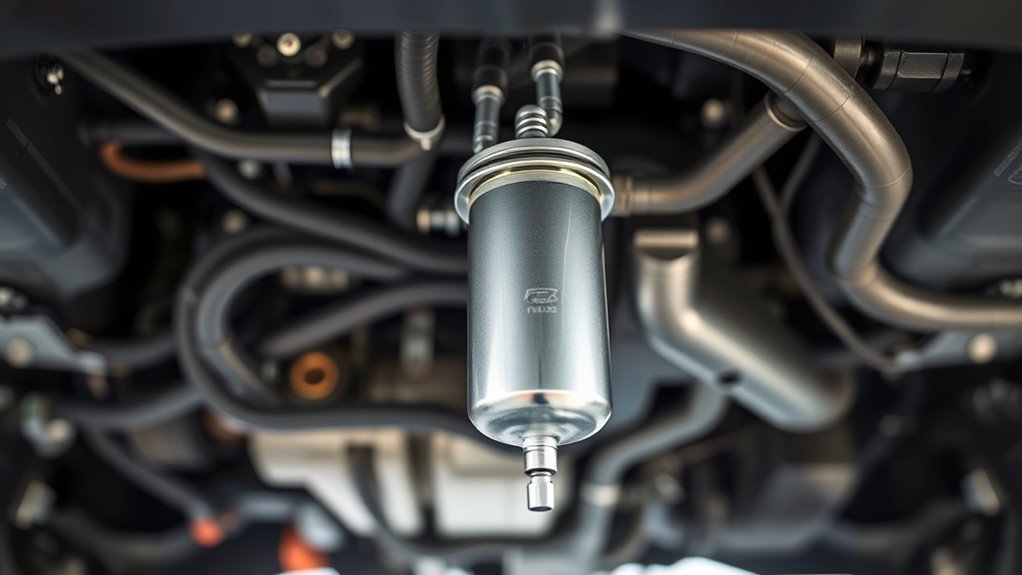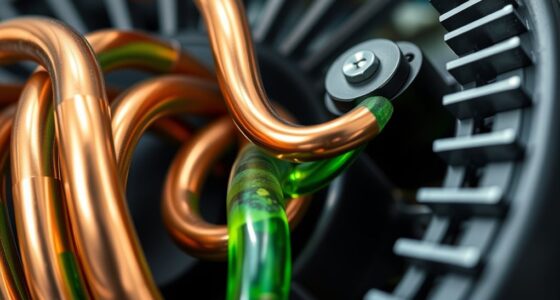Your Ford Transit’s fuel filter is usually located along the fuel line near the tank or under the vehicle, and its exact position depends on your model. You should inspect or replace it roughly every 30,000 to 60,000 miles, but driving in dusty or dirty conditions may require more frequent changes. Signs like engine misfires or power loss indicate it’s time for a new filter. Keep going to learn more about proper replacement steps and maintenance tips.
Key Takeaways
- The fuel filter in a Ford Transit is usually located along the fuel line near the tank or under the vehicle frame.
- Ford recommends inspecting or replacing the fuel filter every 30,000 to 60,000 miles, depending on driving conditions.
- Signs for replacement include engine misfires, power loss, difficulty starting, and decreased fuel efficiency.
- Replacing involves depressurizing the fuel system, disconnecting lines, removing the old filter, and installing a new one in the correct flow direction.
- Proper disposal of the old fuel filter should be followed according to local environmental regulations.

Have you ever wondered how to keep your Ford Transit running smoothly? One essential component that often gets overlooked is the fuel filter. This small but vital part ensures that the fuel entering your engine is free of debris, dirt, and contaminants that could cause damage or reduce efficiency.
Wondering how to keep your Ford Transit running smoothly? Regular fuel filter maintenance is key.
When your fuel filter is dirty or clogged, your engine might sputter, lose power, or even refuse to start. Regular maintenance of this part can save you from costly repairs and keep your Ford Transit performing at its best.
The fuel filter in a Ford Transit is typically located along the fuel line, often near the fuel tank or under the vehicle along the frame. Its exact position can vary depending on the model year and engine type, but generally, you’ll find it either underneath the vehicle or in the engine bay.
If you’re unsure, consulting the owner’s manual or a repair guide can help pinpoint the precise location. Accessing the filter might require lifting the vehicle or removing some engine covers, so it’s wise to have the right tools and take safety precautions.
Knowing when to replace your fuel filter is crucial. Ford recommends inspecting or replacing the filter approximately every 30,000 to 60,000 miles, but this interval can vary based on driving conditions.
If you frequently drive in dusty or dirty environments, or if your fuel quality isn’t consistent, you might need to check the filter more often. Signs that your fuel filter needs replacing include engine misfires, decreased fuel efficiency, difficulty starting the vehicle, or a noticeable drop in power.
If you experience any of these symptoms, don’t delay; replacing the filter promptly can prevent further engine issues.
Replacing the fuel filter is a straightforward task if you follow the proper steps. First, ensure the vehicle is off and the fuel system is depressurized to avoid spills.
Locate the filter and disconnect the fuel lines carefully, making sure to have a container ready to catch any residual fuel. Remove the old filter and install the new one, ensuring the flow direction matches the arrow marked on the filter.
Reattach the fuel lines securely, double-check for leaks, and then start the engine to verify proper operation. Always dispose of the old filter responsibly, following local regulations.
Keeping your Ford Transit’s fuel filter in good condition isn’t just about preventing breakdowns; it’s about maintaining optimal performance and fuel economy. Regular inspections and timely replacements will help ensure your vehicle runs reliably mile after mile. Additionally, understanding the importance of fuel system components can aid in overall vehicle maintenance and longevity.
Frequently Asked Questions
Can I Clean and Reuse the Fuel Filter on My Ford Transit?
You shouldn’t clean and reuse the fuel filter on your Ford Transit. Fuel filters are designed to trap contaminants permanently, and cleaning them often isn’t effective or safe.
Reusing a dirty or clogged filter can cause engine issues or damage. Instead, replace the filter according to your vehicle’s recommended interval.
This ensures your engine runs smoothly and maintains ideal fuel efficiency. Always use the correct replacement parts for your Transit.
What Are Signs of a Failing Fuel Filter in My Ford Transit?
Did you know that a clogged fuel filter can cause engine stalling or misfires? You’ll notice reduced acceleration, difficulty starting, or a drop in fuel efficiency.
If your engine sputters or hesitates under load, it’s a clear sign the filter might be failing. You should also listen for unusual noises and check for fuel smells.
Addressing these signs promptly guarantees your Transit runs smoothly and avoids costly repairs.
How Does a Clogged Fuel Filter Affect Engine Performance?
A clogged fuel filter restricts fuel flow to your engine, causing it to struggle or stall, especially under acceleration. You might notice reduced power, rough idling, or difficulty starting your Ford Transit.
This restriction can also lead to poor fuel efficiency and increased emissions. If you ignore these signs, it could cause damage to your fuel pump or injectors, leading to costly repairs.
Regularly replacing the filter keeps your engine running smoothly.
Are There Different Types of Fuel Filters for Ford Transit Models?
Yes, there are different types of fuel filters for Ford Transit models. You’ll find both inline filters and cartridge-style filters, depending on your specific vehicle year and engine type.
It’s important to choose the right filter to guarantee maximum fuel flow and engine performance. Always check your owner’s manual or consult a professional to select the correct filter, and replace it as recommended for smooth operation.
Is It Safe to Drive With a Partially Clogged Fuel Filter?
It’s best not to push your luck with a partially clogged fuel filter. Driving with one can cause your engine to sputter, stall, or run poorly.
It might also lead to more serious damage down the road. Think of it as a ticking time bomb—you don’t want to wait until it blows up.
Get it checked and replaced promptly to keep your Transit running smoothly and safely.
Conclusion
Regularly replacing your Ford Transit’s fuel filter is essential for ideal performance and fuel efficiency. Did you know that a clogged fuel filter can reduce your vehicle’s fuel economy by up to 20%? By staying on top of the recommended replacement intervals, you prevent costly repairs and keep your engine running smoothly. Don’t overlook this small but crucial maintenance step—it makes a big difference in your Transit’s longevity and reliability.









